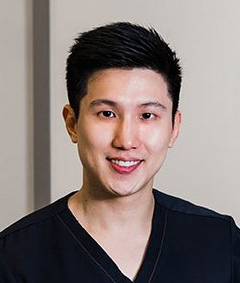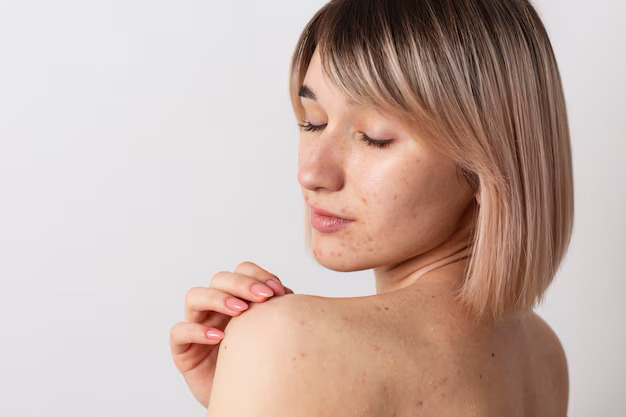Acne isn’t just a passing phase of teenage angst; for many, it’s an enduring battle that extends well beyond puberty. This skin condition plagues not only the face but also the body.
In this article, Dr Justin Boey, Medical Director of Sozo Aesthetic Clinic, focuses on acne and acne scar treatments to find out more. Body acne, or “bacne,” often referred to, can be equally distressing and difficult to handle, affecting comfort, self-esteem, and general well-being. Let’s explore the causes, treatments, and tips for managing body acne, an often-overlooked skin concern.
Contents
What is Body Acne?
Acne vulgaris, the clinical name for acne, is a long-term skin disease when hair follicles are clogged with dead skin cells and oil from the skin. Much like facial acne, body acne manifests in the form of pimples, cysts, and nodules, but it appears on the neck, chest, back, buttocks, and even the arms.
Sometimes, it presents as blackheads developing acne and whiteheads or, more severely, as inflammatory papules, pustules, and nodules. Its appearance can vary depending on the severity and type of acne. The most common factors contributing to body acne are hormonal changes, heredity, and certain types of medication.
The Deeper Causes of Body Acne
Body acne is caused by sebum and dead skin cells which block pores. When this build-up becomes clogged pores or infected with bacteria, it results in inflammation, leading to the characteristic redness and swelling associated with acne. Here are the specific causes and triggers:
Hormonal Fluctuations: Fluctuating hormone levels during puberty, menstruation, pregnancy, and the postpartum period can lead to body acne.
Sweat and Friction: Sweat can combine with oils in the skin to cause further blockages. Clothes and sports equipment that rub the skin can further exacerbate the condition.
Dietary Factors: While diet alone doesn’t cause cystic acne, certain foods may trigger breakouts in some people. Dairy products and foods with high glycemic index are often suspects.
Stress: Although stress doesn’t directly cause acne, it can worsen existing acne or cause hormonal changes that lead to breakouts.
Who Gets Body Acne?

Body acne isn’t a selective condition; it can affect people of all ages. Although it’s often associated with teenagers, it also affects a significant percentage of adults. For many, body acne can persist well into their thirties or forties. Teens may experience the worst acne during this hormonal rollercoaster, but it’s not uncommon for some to struggle with it for a lifetime. It also affects both men and women, though it tends to be more common in males.
Effective Treatments for Body Acne
For those with body acne, the quest for a clear, smooth complexion can feel never-ending. The good news is that numerous acne treatment options are available, ranging from over-the-counter remedies to professional medical procedures. Here are some of the most effective approaches:
Over-the-Counter Solutions
Over-the-counter (OTC) products can be the first defence against body acne. These treatments often contain milder concentrations of active ingredients than prescriptions but can still be effective for mild body acne to moderate body acne.
Salicylic Acid: A beta-hydroxy acid (BHA) known for its exfoliating properties, salicylic acid is particularly effective in unclogging pores by dissolving debris and sebum build-up. Thus, it reduces acne inflammation and promotes clearer skin.
Benzoyl Peroxide: Widely recognized as a potent acne-fighting ingredient, benzoyl peroxide reduces inflammation and targets the Propionibacterium acnes bacteria responsible for acne breakouts. Thus, it is a key player in acne treatment regimens.
Topical Treatments: In body acne care, a diverse range of targeted treatments like lotions, sprays, and gels are available, each offering unique benefits when directly applied to the skin to combat acne and restore skin health.
Prescription Medications

For more severe forms of body acne, it’s important to seek the advice of a professional. Prescription treatments can offer stronger doses or specially formulated acne treatments that aren’t available over the counter.
Topical Antibiotics: Skin specialists commonly prescribe topical antibiotics to minimise the population of P. acnes bacteria present on the skin. Reducing these bacteria helps alleviate inflammation and improve acne symptoms.
Azelaic Acid: This prescription medication is known for its dual action against acne. It targets acne-causing bacteria and regulates keratin production within the skin pores, aiding in preventing acne formation.
Oral Antibiotics: Individuals with moderate to severe body acne may benefit from oral antibiotics. These medications work internally to combat bacteria and address inflammation from a systemic perspective, contributing to an overall improvement in acne.
Natural Remedies
Natural remedies can also provide relief for chest acne for some suffering from body acne. These are best used with other treatments instead of more traditional remedies.
Tea Tree Oil: Extracted from the leaves of the Melaleuca alternifolia plant, tea tree oil is a natural essential oil renowned for its potent antibacterial properties. It works effectively in combating acne by targeting and eliminating acne-causing bacteria, helping to promote clearer skin.
Aloe Vera: Widely acknowledged for its exceptional soothing properties, aloe vera is a succulent plant known to relieve various skin conditions, including acne. Its anti-inflammatory characteristics help to calm red, inflamed acne lesions, reduce skin irritation and promote a more balanced complexion.
Apple Cider Vinegar: Recognised for its versatile benefits, apple cider vinegar is a popular natural remedy in skincare routines. When applied as a toner, apple cider vinegar assists in balancing the skin’s pH levels, a crucial factor in maintaining skin health. Regulating pH levels helps reduce the likelihood of breakouts and promotes overall skin clarity and balance.
Skincare Routines for Body Acne
A proper skincare routine can make a significant difference in managing body acne. It’s crucial to develop a gentle yet effective regimen for treating body acne and stick with it consistently. Here are a few guidelines for creating a body acne skincare routine:
Daily Skincare Tips
Gentle Cleansing: It’s important to use a gentle, non-comedogenic cleanser to wash the affected area. Avoid scrubbing too vigorously, leading to skin irritation and exacerbating acne. Remember, gentle care is key in managing your skin’s health.
Exfoliating: Regular exfoliation significantly removes dead skin cells that may otherwise clog your pores. Consider exfoliating once or twice a week using a non-abrasive exfoliant to maintain a healthy skin texture and prevent breakouts.
Moisturising: Hydration is essential even for acne-prone skin. Opt for non-greasy, non-comedogenic moisturisers that provide hydration without clogging hair follicles. Keeping your skin moisturised can help balance oil production and promote overall health.
Choosing the Right Products
Non-comedogenic: When products are labelled as non-comedogenic, they are formulated to be less likely to clog pores. This feature can prevent the occurrence of new acne breakouts, making it a preferred choice for those with acne-prone skin.
Oil-Free: Oil-free products are a good choice for individuals dealing with acne. These formulations are typically lighter in texture and less likely to aggravate existing acne conditions, offering a suitable option for skincare routines.
Active Ingredients: Prioritise products incorporating well-established acne-fighting components such as benzoyl peroxide or salicylic acid. These active ingredients are known for their efficacy in targeting acne-causing factors and aiding in managing acne-prone skin.
Lifestyle Changes to Prevent Body Acne

Incorporating some simple lifestyle changes can also help prevent body acne. Lifestyle factors like diet, hydration, clothing choices, and stress management can all impact the health of your skin.
Diet and Hydration: Research suggests that a diet high in processed foods and sugars might contribute to acne. Drinking plenty of water and eating a healthy diet can help keep your skin healthy.
Clothing and Fabric Choices: Avoid wearing tight clothing that can trap sweat and oil against your skin. Opt for loose, breathable fabrics like cotton.
Stress Management and Exercise: Regular exercise can improve circulation and help manage stress, which can help alleviate acne. Practices like yoga, meditation, or hobbies can effectively reduce stress levels.
When to See a Professional Aesthetic Practitioner
Sometimes, body acne is stubborn and can be a sign of a more serious skin condition. It’s important to recognise when home remedies and over-the-counter acne treatments aren’t enough to treat body acne. If your body acne is severe, doesn’t respond to treatment, or is causing emotional distress, it’s time to consult a professional.
What an Aesthetic Practitioner Can Do for You
An experienced professional can assess your acne and recommend treatment or a referral if necessary. At SOZO Aesthetic Clinic, led by Dr. Justin Boey, experienced practitioners can offer a range of treatments for body acne, including:
Chemical Peels: Chemical peels, a cosmetic procedure, benefit acne-prone skin by exfoliating the skin’s top layer, promoting healthy skin cell turnover, and improving skin texture and tone.
Laser Therapy: Laser treatments, a non-invasive option, target inflamed acne by destroying acne-causing bacteria and reducing excess oil production in the oil glands, leading to clearer skin and reduced acne symptoms.
Topical Prescription Treatments: Skincare professionals can provide personalised topical treatments specifically formulated to target and treat body acne, facial acne, and even different types of acne, helping to effectively manage and improve skin conditions.
Conclusion
Living with body acne can be challenging, but you are not alone. You can manage and improve your body acne by understanding the causes, exploring effective treatments, and adopting simple lifestyle changes. Clear skin takes time, and consistency is key to seeing results.
Whether implementing a new skincare regimen, seeking a trusted aesthetic practitioner, or exploring professional treatment options, approach the process with patience and commitment. Your clear skin goal is attainable, and with the right approach, you can enjoy the comfort and confidence that comes with healthy, blemish-free skin.





